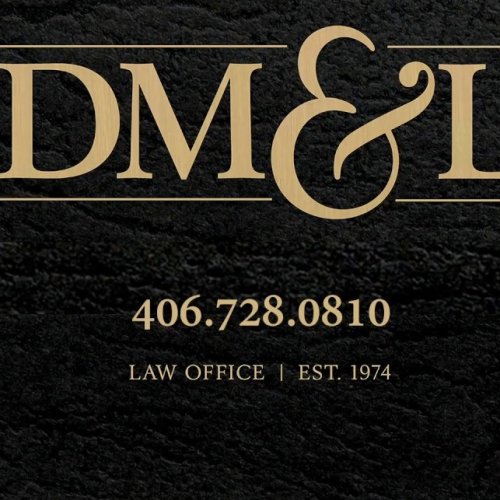Best Bad Faith Insurance Lawyers in Montana
Share your needs with us, get contacted by law firms.
Free. Takes 2 min.
Or refine your search by selecting a city:
List of the best lawyers in Montana, United States
About Bad Faith Insurance Law in Montana, United States
Bad faith insurance refers to the improper or dishonest conduct by an insurance company when handling its policyholder's claim. In Montana, insurance companies are legally required to treat their customers fairly and to process claims promptly, honestly, and in good faith. If an insurer unreasonably delays, denies, or undervalues a legitimate insurance claim, the policyholder may have grounds to pursue a bad faith claim against the insurer. This area of law is intended to protect consumers from unfair insurance practices and to hold insurers accountable when they fail to honor their contractual and statutory obligations.
Why You May Need a Lawyer
Seeking legal assistance is often crucial when facing bad faith insurance issues. Some common situations in Montana where people turn to legal experts include:
- Your valid insurance claim is delayed without explanation.
- Your claim is denied without a reasonable investigation or a clear reason.
- The payout offered by your insurer is significantly less than the value of your loss.
- Your insurer fails to respond to your inquiries or requests for information.
- The insurer misrepresents policy terms or uses obscure policy language to deny your claim.
- You suspect the insurer is stalling or pressuring you to accept an unfair settlement.
- You face retaliation from your insurer after questioning their decisions.
A qualified attorney can help you understand your rights, gather evidence, negotiate with the insurance company, and if necessary, litigate to pursue compensation for damages, including possible punitive damages under Montana law.
Local Laws Overview
Montana has specific statutes and case law governing the conduct of insurance companies when handling claims. Key aspects include:
- Montana's Unfair Trade Practices Act prohibits insurers from engaging in unfair or deceptive acts or practices, including failing to act promptly on claims, not conducting reasonable investigations, or refusing to pay claims without a reasonable basis.
- First-party bad faith claims allow policyholders to sue their own insurer for wrongful claim handling. Third-party bad faith can arise if an insurer fails to settle claims within policy limits on behalf of its insured.
- Montana courts have established that insurers may be liable for both actual and punitive damages in bad faith cases when their conduct is proven to be willful or egregious.
- Policyholders must typically show the insurer had no reasonable basis to deny the claim and either knew or recklessly disregarded the lack of a reasonable basis.
- There are statutes of limitations for bringing a bad faith claim, often three years from the date of the unfair action, but legal advice is needed to determine precise time limits.
- Montana offers some of the strongest consumer protections in the nation, often allowing for broader recovery in bad faith cases compared to many other states.
Frequently Asked Questions
What is considered insurance bad faith in Montana?
Insurance bad faith in Montana occurs when an insurance company unreasonably refuses to pay a legitimate claim, delays payment without justification, fails to properly investigate a claim, or otherwise refuses to fulfill its contractual obligations to the policyholder.
Can I sue my insurance company for bad faith in Montana?
Yes, Montana law allows you to file a lawsuit if your insurance company acts in bad faith. This includes seeking compensation beyond what is owed under your policy, such as additional damages for emotional distress, attorneys' fees, and sometimes punitive damages.
What are examples of bad faith conduct by insurers?
Examples include denying a claim without adequate investigation, delaying payment without reason, misrepresenting policy terms, making unreasonable demands for documentation, or offering unreasonably low settlements.
How do I prove bad faith by my insurer?
You must show that the insurer denied or mishandled your claim without a reasonable basis and that they knew or recklessly disregarded the lack of a reasonable basis. Evidence such as correspondence, denial letters, and claim documentation can support your case.
What damages can I recover in a bad faith insurance lawsuit?
Depending on your case, you may receive the original policy benefit, damages for financial losses caused by the insurer's actions, compensation for emotional distress, attorneys' fees, and in some cases, punitive damages.
Is there a time limit for filing a bad faith insurance lawsuit in Montana?
Yes, the statute of limitations for most bad faith lawsuits in Montana is three years from the date of the insurer's wrongful action. However, determining the exact deadline can be complex, so legal advice is recommended.
Do I need a lawyer to pursue a bad faith claim?
While not required, having a lawyer is highly beneficial. Insurance companies have legal teams and resources, and a lawyer can help you build your case, negotiate settlements, and represent you in court if needed.
Can I still sue if I already accepted a partial payment from my insurer?
In some cases, accepting partial payment does not prevent you from suing for the remainder or for bad faith if the settlement was not fairly negotiated or was coerced. Consult a lawyer for specific advice.
Which types of insurance are covered by bad faith laws in Montana?
Bad faith laws generally cover most types of insurance, including auto, homeowners, health, and commercial insurance policies, provided you are the policyholder or an insured party under the policy.
What should I do if I suspect my insurer of bad faith?
Document all interactions with your insurer, save all correspondence, ask for reasons in writing if your claim is denied or delayed, and consult a qualified attorney specializing in bad faith insurance law as soon as possible.
Additional Resources
If you are dealing with a bad faith insurance issue in Montana, the following organizations and agencies may be helpful:
- Montana Commissioner of Securities and Insurance (CSI): Handles consumer insurance complaints and provides information on filing grievances against insurance companies.
- Montana State Bar: Offers lawyer referral services to connect you with qualified attorneys experienced in insurance law.
- National Association of Insurance Commissioners (NAIC): Provides educational materials on consumer insurance rights and complaint procedures.
- Local Legal Aid Services: Provides free or low-cost legal help to eligible Montana residents facing insurance disputes.
Next Steps
If you believe your insurance company is acting in bad faith, consider taking the following steps:
- Gather and organize all documentation related to your insurance policy, claim, and communications with your insurer.
- Request written explanations from your insurer for any denials, delays, or settlement offers.
- Contact the Montana Commissioner of Securities and Insurance to file a formal complaint if appropriate.
- Consult with an attorney who specializes in insurance bad faith law to assess your situation and determine your legal options.
- If your case proceeds, your attorney can help negotiate with the insurance company or pursue a lawsuit on your behalf, seeking full compensation for your losses and any additional damages allowed by law.
Understanding your rights under Montana law is the first step toward protecting yourself when insurance problems arise. With appropriate guidance and action, you can hold your insurer accountable and pursue the benefits and compensation you deserve.
Lawzana helps you find the best lawyers and law firms in Montana through a curated and pre-screened list of qualified legal professionals. Our platform offers rankings and detailed profiles of attorneys and law firms, allowing you to compare based on practice areas, including Bad Faith Insurance, experience, and client feedback.
Each profile includes a description of the firm's areas of practice, client reviews, team members and partners, year of establishment, spoken languages, office locations, contact information, social media presence, and any published articles or resources. Most firms on our platform speak English and are experienced in both local and international legal matters.
Get a quote from top-rated law firms in Montana, United States — quickly, securely, and without unnecessary hassle.
Disclaimer:
The information provided on this page is for general informational purposes only and does not constitute legal advice. While we strive to ensure the accuracy and relevance of the content, legal information may change over time, and interpretations of the law can vary. You should always consult with a qualified legal professional for advice specific to your situation.
We disclaim all liability for actions taken or not taken based on the content of this page. If you believe any information is incorrect or outdated, please contact us, and we will review and update it where appropriate.
Browse bad faith insurance law firms by city in Montana
Refine your search by selecting a city.











